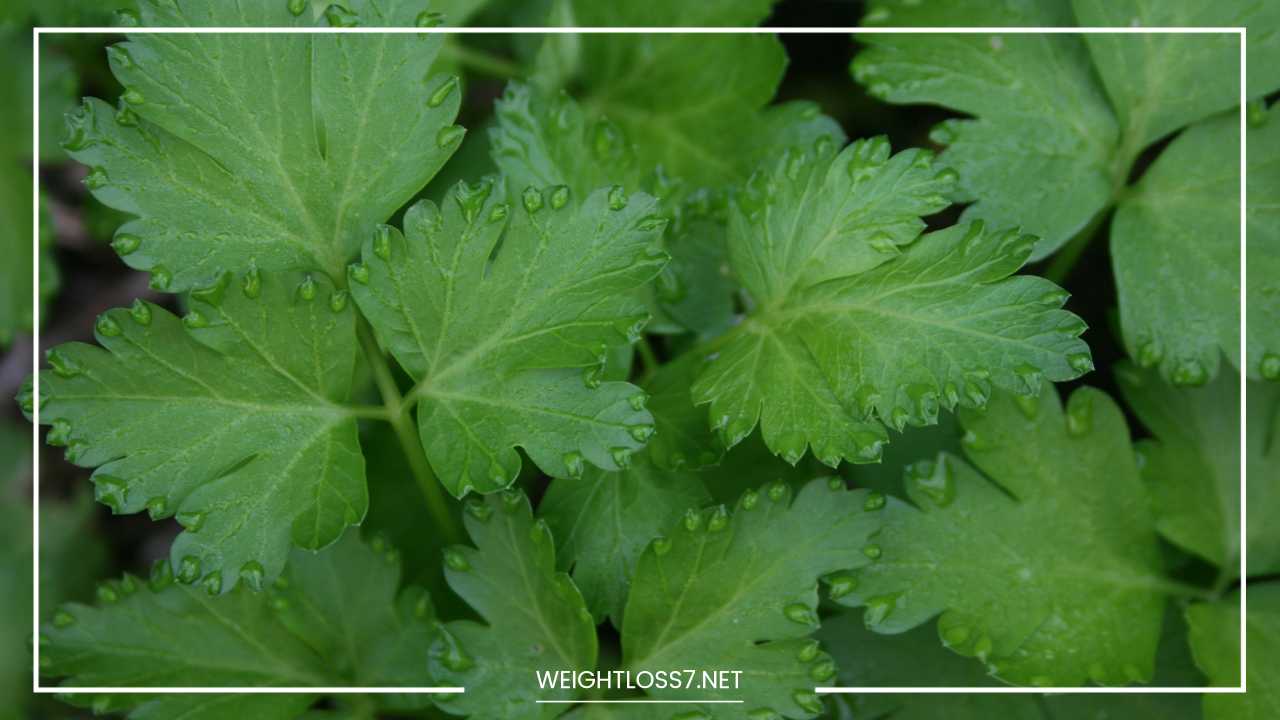Parsley Uses and Health Benefits

Parsley
Parsley: A Tiny Herb with Big Benefits
Parsley, often seen merely as a decorative touch on a plate or a flavor enhancer in dishes, is a remarkable herb with significant health benefits and nutritional value. Originating from the Mediterranean region, parsley has become a staple in cuisines worldwide.
This versatile herb deserves more recognition than its role as a garnish. Packed with vitamins, minerals, and antioxidants, parsley can support various aspects of health and enhance the flavors of countless dishes.
This comprehensive guide will delve into the numerous benefits of parsley, its culinary uses, and practical tips for incorporating it into your daily life.
Nutritional Powerhouse
Parsley is an incredible source of essential nutrients, providing a variety of health benefits through its rich content of vitamins, minerals, and antioxidants.
Despite its small size, parsley is a nutritional powerhouse that can have a significant impact on overall health.
Vitamins
- Vitamin A: Essential for maintaining healthy vision, vitamin A also supports immune function and skin health. Parsley provides beta-carotene, which the body converts into vitamin A. This vitamin plays a critical role in cell growth and differentiation, as well as maintaining the integrity of mucous membranes.
- Vitamin C: This powerful antioxidant is crucial for the repair and growth of tissues in the body. Vitamin C helps protect cells from damage caused by free radicals and supports immune function. It also aids in the absorption of iron from plant-based foods, enhancing overall nutrient uptake.
- Vitamin K: Parsley is particularly rich in vitamin K, which is vital for bone health and blood clotting. Vitamin K helps regulate calcium in the bones and blood, playing a crucial role in maintaining bone density and reducing the risk of fractures. Additionally, vitamin K supports cardiovascular health by helping to prevent the calcification of arteries.
- Folate: Also known as vitamin B9, folate is essential for DNA synthesis and repair. It is especially important during periods of rapid growth, such as pregnancy and infancy. Folate helps produce red blood cells and prevent anemia. Adequate folate intake is linked to a lower risk of certain birth defects and cardiovascular diseases.
- Vitamin B12: While parsley is not a significant source of vitamin B12, it still contains small amounts. Vitamin B12 is necessary for red blood cell formation, nerve function, and DNA synthesis. It is primarily found in animal products, so individuals following a plant-based diet may need to seek alternative sources or supplements.
Minerals
- Iron: Iron is essential for transporting oxygen throughout the body and is a key component of hemoglobin in red blood cells. Parsley provides a plant-based form of iron that can help prevent iron deficiency anemia. Pairing parsley with vitamin C-rich foods can enhance iron absorption.
- Calcium: Known for its role in bone health, calcium also supports muscle function, nerve transmission, and blood clotting. Parsley contains a modest amount of calcium, contributing to overall bone health and helping to maintain proper muscle and nerve function.
- Potassium: This mineral is crucial for maintaining fluid balance, regulating blood pressure, and supporting proper muscle and nerve function. Parsley’s potassium content helps counteract the effects of sodium and supports cardiovascular health by promoting healthy blood pressure levels.
- Magnesium: Magnesium is involved in over 300 enzymatic reactions in the body, including those related to energy production, muscle contraction, and nerve function. It also supports bone health and helps regulate blood sugar levels. Parsley provides a small but beneficial amount of magnesium.
Antioxidants
- Flavonoids: These plant compounds have powerful antioxidant properties that help reduce inflammation and protect against oxidative stress. Flavonoids in parsley, such as apigenin and luteolin, have been shown to support cardiovascular health and may have anti-cancer effects.
- Carotenoids: Carotenoids, including lutein and zeaxanthin, are known for their role in eye health. They help protect the eyes from harmful light and oxidative damage. The carotenoids in parsley support overall vision health and may reduce the risk of age-related macular degeneration.
- Coumarins: These compounds have anti-inflammatory and anti-cancer properties. Coumarins in parsley, such as umbelliferone, may help reduce inflammation and protect against cancerous cell growth.
Culinary Uses
Parsley’s versatility extends far beyond its use as a garnish. Its fresh, slightly peppery flavor enhances a wide range of dishes, from salads to soups. Here are some popular ways to incorporate parsley into your meals:
Garnish
Parsley is a classic garnish that adds a touch of color and freshness to various dishes. Whether sprinkled over soups, stews, or grilled meats, parsley enhances the visual appeal and flavor profile of a dish. Its bright green hue provides a vibrant contrast to rich and hearty foods.
Salads
Adding chopped parsley to salads not only boosts flavor but also increases the nutritional value of the dish. Parsley pairs well with a variety of salad ingredients, from crisp vegetables to hearty grains. Its fresh, herbaceous notes complement both simple green salads and more complex grain-based salads.
Sauces and Dressings
Parsley is a key ingredient in many sauces and dressings, including classic parsley sauce and pesto. It adds a fresh, herbal flavor that can enhance the taste of pasta, grilled meats, and roasted vegetables.
Try blending parsley with garlic, nuts, and olive oil to create a flavorful pesto or mix it into dressings for a burst of freshness.
Soups and Stews
Simmering parsley in soups and stews imparts a subtle yet distinctive flavor. It works well in both vegetarian and meat-based soups, adding depth and complexity to the broth.
Parsley can be added early in the cooking process to infuse its flavor or as a finishing touch for a burst of freshness.
Herbes de Provence
Parsley is a key ingredient in the French herb blend known as Herbes de Provence. This aromatic mixture typically includes thyme, rosemary, basil, and lavender, along with parsley. It is used to season a variety of dishes, from roasted meats to vegetable medleys, providing a distinctive and savory flavor.
Health Benefits
Parsley’s health benefits extend far beyond its nutritional profile. Its potential therapeutic properties make it a valuable addition to a healthy lifestyle. Here’s a closer look at some of the key health benefits associated with parsley:
Digestive Health
- Improved Digestion: Parsley’s fiber content supports healthy digestion by promoting regular bowel movements and preventing constipation. Fiber adds bulk to the stool, making it easier to pass through the digestive tract.
- Reduced Bloating: Parsley’s diuretic properties can help alleviate bloating and water retention by increasing urine production and flushing excess fluids from the body. This can be particularly beneficial for individuals experiencing temporary bloating or swelling.
- Anti-inflammatory Effects: Certain compounds in parsley, such as flavonoids and carotenoids, have anti-inflammatory properties that may help soothe digestive discomfort and reduce inflammation in the gastrointestinal tract.
Bone Health
- Increased Bone Density: Parsley is a rich source of vitamin K, which plays a crucial role in maintaining bone health. Vitamin K helps regulate calcium metabolism, supporting bone density and reducing the risk of fractures.
- Reduced Osteoporosis Risk: Regular consumption of parsley may help lower the risk of osteoporosis, a condition characterized by weakened bones and increased susceptibility to fractures. Vitamin K and other nutrients in parsley contribute to overall bone health and strength.
Cardiovascular Health
- Lowered Blood Pressure: Potassium in parsley helps regulate blood pressure by counteracting the effects of sodium. Maintaining healthy blood pressure levels is essential for reducing the risk of cardiovascular diseases such as heart attack and stroke.
- Antioxidant Protection: The antioxidants in parsley, including flavonoids and carotenoids, help protect the cardiovascular system from oxidative stress and inflammation. This protection supports heart health and reduces the risk of heart disease.
Antioxidant Protection
- Neutralization of Free Radicals: Antioxidants in parsley help neutralize harmful free radicals that can cause cellular damage and contribute to chronic diseases such as cancer and heart disease. By reducing oxidative stress, parsley supports overall health and longevity.
- Reduced Inflammation: The anti-inflammatory properties of parsley’s antioxidants help reduce inflammation in the body. Chronic inflammation is associated with various health issues, including cardiovascular disease, arthritis, and metabolic disorders.
Urinary Health
- Diuretic Effects: Parsley’s diuretic properties help increase urine production, which aids in flushing out toxins and waste products from the body. This can support overall urinary health and prevent the buildup of harmful substances.
- Prevention of Kidney Stones: Some studies suggest that parsley may help prevent the formation of kidney stones by promoting healthy urine flow and reducing the concentration of minerals that can lead to stone formation. Adequate hydration and a balanced diet are also important factors in kidney stone prevention.
How to Incorporate Parsley into Your Diet
Incorporating parsley into your diet is easy and rewarding. Here are some practical tips for making the most of this nutritious herb:
Keep It Fresh
To maximize the shelf life of fresh parsley, store it in the refrigerator in a glass of water. Cover the glass with a plastic bag to maintain moisture and prevent wilting. Alternatively, you can wrap parsley in a damp paper towel and place it in a plastic bag before refrigerating.
Use It Daily
Make parsley a regular part of your meals by adding it to a variety of dishes. Sprinkle it over soups, salads, and main courses for a burst of flavor and nutrients. Experiment with different recipes to discover new ways to enjoy parsley.
Experiment with Recipes
Try incorporating parsley into different types of dishes, from traditional recipes to creative culinary experiments. Parsley can be used in a wide range of cuisines, including Mediterranean, Middle Eastern, and Latin American. Explore recipes such as tabbouleh, chimichurri, and stuffed grape leaves to make the most of parsley’s versatility.
Parsley Tea
Parsley tea is a soothing and healthful way to enjoy the benefits of this herb. To make parsley tea, steep fresh or dried parsley leaves in hot water for 5-10 minutes. You can add honey or lemon for extra flavor. Parsley tea can support digestion, detoxification, and overall well-being.
Safety and Precautions
While parsley is generally safe for most people when consumed in moderation, there are some considerations to keep in mind:
- Excessive Consumption: Consuming large amounts of parsley may lead to digestive issues, such as diarrhea or stomach upset. Moderation is key to avoiding any potential adverse effects.
- Pregnancy and Breastfeeding: Pregnant and breastfeeding women should consult with a healthcare provider before consuming large quantities of parsley. While parsley is safe in typical culinary amounts, excessive intake may have potential effects on pregnancy and lactation.
- Blood Thinners: Parsley contains vitamin K, which can interact with blood-thinning medications such as warfarin. Vitamin K plays a role in blood clotting, so individuals on blood thinners should monitor their parsley intake and consult with a healthcare provider to ensure it does not interfere with their medication.
Final Thoughts
Parsley is a remarkable herb that offers a multitude of health benefits and culinary applications. Its rich nutritional profile, including essential vitamins, minerals, and antioxidants, supports various aspects of health, from digestion and bone health to cardiovascular well-being.
Parsley’s versatility in the kitchen makes it a valuable ingredient for enhancing the flavor and nutritional value of a wide range of dishes.
By incorporating parsley into your daily diet, you can enjoy its fresh flavor and reap the rewards of its health-promoting properties.
Whether used as a garnish, in salads, sauces, or soups, parsley adds a burst of freshness and nutrition to your meals. Additionally, parsley tea provides a soothing and healthful way to benefit from this incredible herb.
With its many benefits and ease of use, parsley deserves a place of honor in your diet and your kitchen. Embrace the power of parsley and discover the numerous ways it can enhance your health and well-being.

















